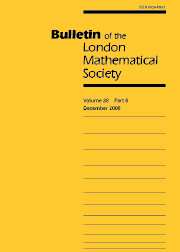Article contents
factoring nonnil ideals into prime and invertible ideals
Published online by Cambridge University Press: 23 September 2005
Abstract
for a commutative ring $r$, let $\nil(r)$ be the set of all nilpotent elements of $r$, $z(r)$ the set of all zero divisors of $r$, and $t(r)$ the total quotient ring of $r$. set $\mathcal{h} = \{r \mid r$ is a commutative ring and $\nil (r)$ is a divided prime ideal of $ r \}$. for a ring $r \in \mathcal{h}$, let $\phi : t(r) \longrightarrow r_{\nil (r)}$ be such that $\phi(a/b) = a/b$ for every $a \in r$ and $b \in r\backslash z(r)$. a ring $r$ is called a zpui ring if every proper ideal of $r$ can be written as a finite product of invertible and prime ideals of $r$. this paper gives a generalization of the concept of zpui domains (which was extensively studied by olberding) to the context of rings that are in the class $\mathcal{h}$. let $r \in \mathcal{h}$. if every nonnil ideal of $r$ can be written as a finite product of invertible and prime ideals of $r$, then $r$ is called a nonnil zpui ring; also, if every nonnil ideal of $\phi(r)$ can be written as a finite product of invertible and prime ideals of $\phi(r)$, then $r$ is called a nonnil$\phi$-zpui ring. the theory of $\phi$-zpui rings is shown here to resemble that of zpui domains.
Keywords
- Type
- papers
- Information
- Copyright
- the london mathematical society 2005
- 15
- Cited by


